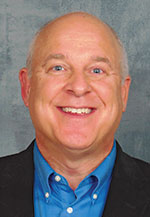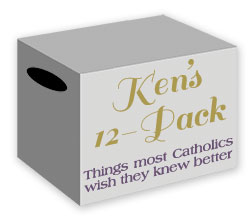Ken’s 12-Pack / Ken Ogorek
Things most Catholics wish they knew better about their faith
 First in a yearlong series
First in a yearlong series
“What does the Church teach about that?” With few exceptions, most adult Catholics don’t feel confident in their knowledge of the Catholic faith.
Critics of catechesis in the 1970s and 1980s use words like “fuzzy” to describe what they perceive as religious education that was light on content. And while it’s important to note that folks involved with faith formation from the late 1960s through the early 1990s weren’t intentionally trying to do catechesis poorly, in hindsight we can identify 10 areas of doctrinal deficiency in the religious upbringing of most people who are parents—and grandparents—today.
The late, great Archbishop Daniel M. Buechlein was happy to see the Catechism of the Catholic Church become available in the mid-1990s. He spearheaded an effort to evaluate religion textbook series in light of this new catechism for the universal Church—the sure norm for determining doctrinal accuracy and completeness.
 Through his involvement with the U.S. Conference of Catholic Bishops, Archbishop Buechlein helped coordinate an evaluation of several elementary textbook series—resources that hadn’t changed much in their doctrinal content for 20 years or so. While the goal of this evaluation process was mainly future-oriented—wanting to ensure that doctrinal content in catechetical materials met the standard provided by the Catechism of the Catholic Church—after a half dozen or so of the most widely used catechetical series were evaluated, a clear pattern of doctrinal deficiencies emerged.
Through his involvement with the U.S. Conference of Catholic Bishops, Archbishop Buechlein helped coordinate an evaluation of several elementary textbook series—resources that hadn’t changed much in their doctrinal content for 20 years or so. While the goal of this evaluation process was mainly future-oriented—wanting to ensure that doctrinal content in catechetical materials met the standard provided by the Catechism of the Catholic Church—after a half dozen or so of the most widely used catechetical series were evaluated, a clear pattern of doctrinal deficiencies emerged.
In a landmark report to his brother bishops, Archbishop Buechlein in June of 1997 validated the concerns about fuzziness that had been expressed by proponents of authentic catechetical renewal. His report can be read at cutt.ly/1997report.
For our purposes, Archbishop Buechlein’s report provides not so much deficiencies to be dwelled on, but rather areas of Church teaching to include in this 12-part monthly series of Criterion columns. What are some key doctrinal and moral teachings of our holy Catholic Church that might not have been taught so well when adult Catholics of today were children? Why is it important that Catholics of all ages enjoy clarity on these items that God, in his great love for us, has chosen to reveal?
Each month, starting in February, we’ll identify one item from the deficiency list. We’ll share a bit of clear teaching on this area of our Catholic faith—including how the doctrinal or moral teaching relates to our life today.
What are some examples of these Church teachings that many adult Catholics wish they knew better? A prime instance of fuzziness contributing to confusion lays in the Christian view of the human person—or lack thereof. When we’re unclear on who and what a human person is—and is not—chaos can ensue regarding morality, economics and politics to name a few key aspects of our life together in society.
Archbishop Charles C. Thompson considers clarity on the Christian view of the human person so important that his first pastoral letter to the faithful of our archdiocese addressed this very topic. “We are One in Christ: A Pastoral Letter on Fundamentals of Christian Anthropology” can be found at www.archindy.org/pastoral2018. A link to a study guide is available at the top of the page.
So sit back and prepare to have your thirst for knowledge quenched by Ken’s 12-Pack. I look forward to these monthly opportunities to connect with many faithful Criterion readers.
(Ken Ogorek, archdiocesan director of catechesis, has lost his six-pack abs. But his 12-part series, whose theme is: Things Most Catholics Wish They Knew Better, will run through December. He can be reached at his archdiocesan e-mail address kogorek@archindy.org or by using the contact information at www.kenogorek.com.) †
 First in a yearlong series
First in a yearlong series
 Through his involvement with the U.S. Conference of Catholic Bishops, Archbishop Buechlein helped coordinate an evaluation of several elementary textbook series—resources that hadn’t changed much in their doctrinal content for 20 years or so. While the goal of this evaluation process was mainly future-oriented—wanting to ensure that doctrinal content in catechetical materials met the standard provided by the Catechism of the Catholic Church—after a half dozen or so of the most widely used catechetical series were evaluated, a clear pattern of doctrinal deficiencies emerged.
Through his involvement with the U.S. Conference of Catholic Bishops, Archbishop Buechlein helped coordinate an evaluation of several elementary textbook series—resources that hadn’t changed much in their doctrinal content for 20 years or so. While the goal of this evaluation process was mainly future-oriented—wanting to ensure that doctrinal content in catechetical materials met the standard provided by the Catechism of the Catholic Church—after a half dozen or so of the most widely used catechetical series were evaluated, a clear pattern of doctrinal deficiencies emerged.